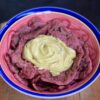Dr. Somappa started out as a veterinarian in rural North Karnataka. He used to operate in an agricultural area that had been practicing chemical farming for decades. During his treatment of animals in the area, especially cows, he noticed a peculiar pattern emerging.
A lot of cows were facing reproductive issues across the board and the cause was not immediately evident. This is when he started investigating the issue. He began by examining the diet of the cows in question. There was a lot of rice cultivation in the area and it came to his notice that the cows were being fed the paddy after the rice had been extracted from it.
He took samples of this feed and sent it to a laboratory in Bangalore for testing. To his surprise, the results showed alarmingly high levels of chemical residues from chemical fertilisers and pesticides that were being used on the crops. This is when he realised that the reproductive issues of the cows could be linked to these harmful chemical residues.
This sounded alarm bells for him. Being from an agricultural family himself he realised that even his own family were engaging in these unhealthy farming practices. His fear was that if the levels of chemical residue were so high in the crop discards, the levels of the chemicals in the produce itself must be catastrophically high.
Concerned about the health of his family and the customers who bought their produce he decided to try and remedy the situation. He started by trying to educate people in his family and village about the harmful effects of chemical farming and alternatives like natural farming. Although natural farming had been the traditional method of crop cultivation, it had been decades since anybody had practiced it. To add to that, the subsidies given by the government on the chemical fertilisers and pesticides meant that his proposition was met with much resistance.
After many futile attempts at reform in his village, he decided that the only way to make people believe in what he was saying was to put his money where his mouth was. He put his veterinary practice on hold, bought a plot of land and started natural farming himself. Among other things, he purchased 500 saplings of a variety of mangoes from Andhra Pradesh. Known to be too sour to be sold as a fruit for consumption, this variety was used exclusively for pickling. The unique thing about this variety of mango was that bore fruit twice a year as opposed to once a year for the standard market varieties of mangoes.
People thought he was making a big mistake in trying to grow these mangoes to compete with popular market varieties of mangoes but he had a plan. He cultivated these trees using natural farming methods and the mangoes which were usually too sour for raw consumption turned out to be extremely sweet and palatable. Delighted with the turnout of the crop, he renamed this variety of mangoes from Purna(as it was known locally) to Purnavasu, his own variety.
Farmizen sells a lot of mangoes in the summer mango season. The insatiable craving for mangoes during the summer leads to them selling out faster than we can procure them. This is expected. But when we procured the Purnavasu mangoes from Dr. Somappa in the month of October, this was a game-changer. Customers were not expecting to be able to buy naturally grown mangoes during the off-season. This meant that every batch of mangoes was selling out within minutes on the Farmizen app and the feedback was amazing. Customers were absolutely delighted with these juicy, sweet mangoes.
For Dr. Somappa, this was a big success. He had proven that natural farming techniques were not only good for the soil and consumer health but also a financially viable option for farmers to explore. Today he is using his success story to try and convince farmers in his area to make the switch and give up chemical farming.
We at Farmizen salute his efforts and will continue to support him in his endeavors. Download the Farmizen app today and buy fruits directly from farmers like Dr. Somappa.


Comment